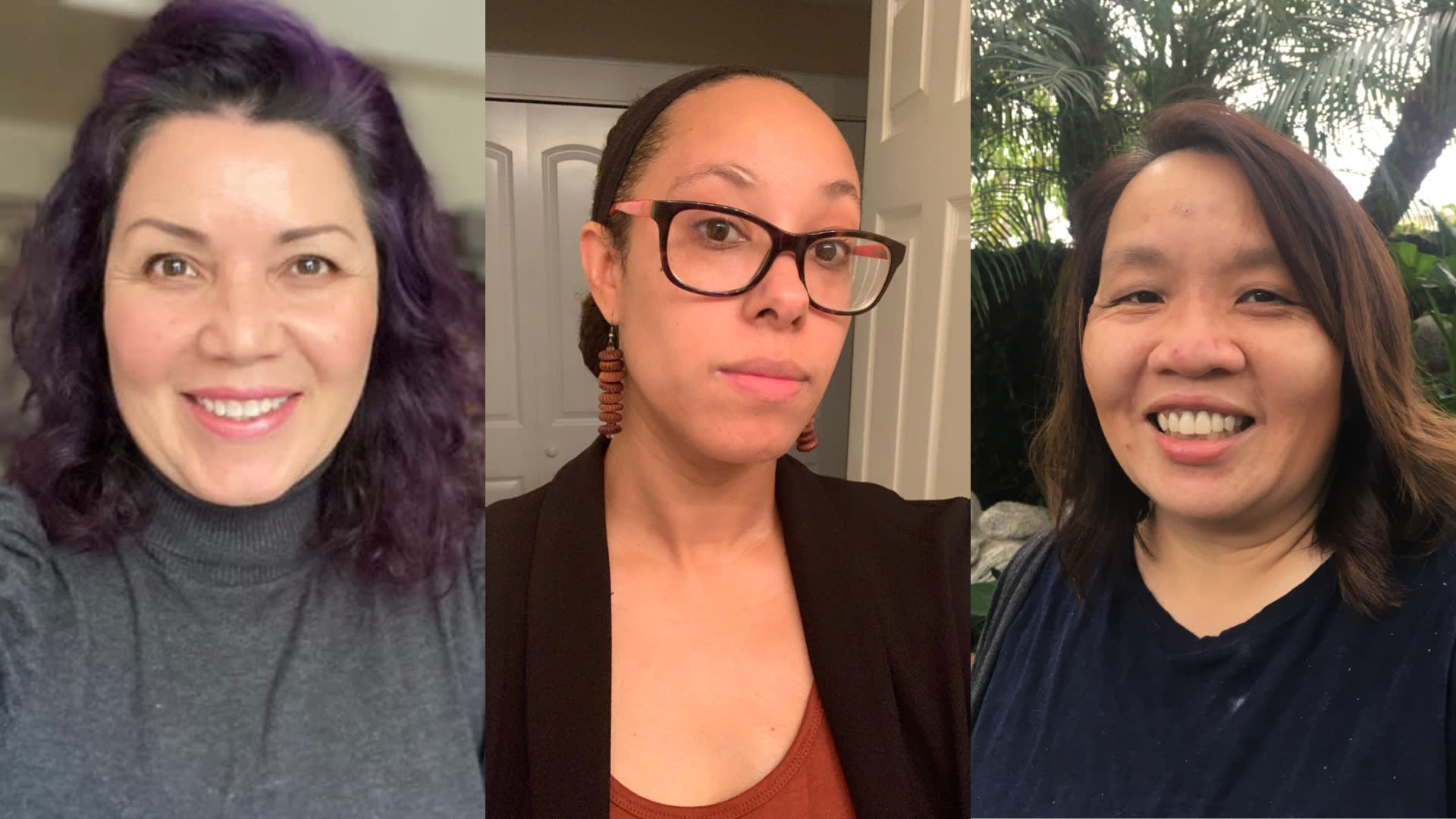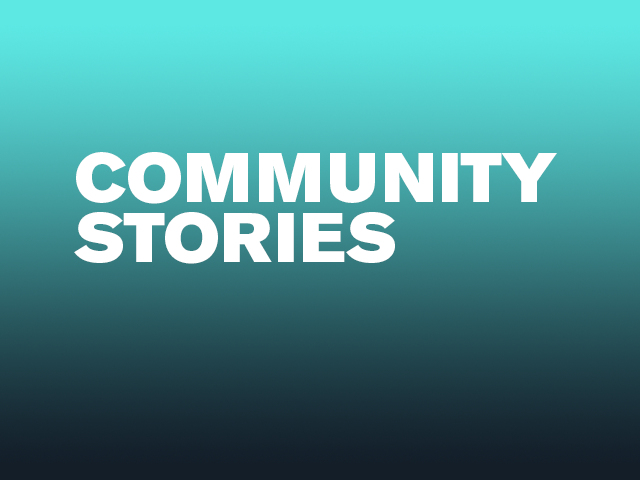Meet the Playwrights Behind the Community Stories Project

As a direct response to the pandemic interrupting Center Theatre Group’s community programs such as our free workshops and library play reading series, Community Partnerships Director Jesus A. Reyes devised a virtual solution—the Community Stories project. “All in-person community programs have taken place at sites throughout Boyle Heights, but the online community was one I’ve been interested in tapping into and growing for a long time,” said Reyes. “When we all had to stay indoors and do our work from home, it was the perfect opportunity to expand virtually.”
To continue supporting the local creative community throughout the shutdown, we invited over 30 local L.A. theatre artists to create stories for their own communities. “These programs have always been designed with community members and local artists in mind,” said Reyes. “Working with the artists during the pandemic was a no-brainer—it was a way to get money into their pockets and keep them creating. It’s the artists who not only shine a light on necessary issues, but also lift us up from our doldrums.”
What resulted from this collaboration was a vast collection of content that ranges from the daily life of a theatre artist during the shutdown to a series of short exposés on the history of queer food and stage makeup tutorials.
We recently sat down for a conversation with three of our commissioned playwrights— Diana Burbano (Essentials), Julie Taiwo Oni (Bola Blue-Eyes), and Judy Soo Hoo (Sandi Koto of the San Gabriel Valley)—to discuss their stories and find out what inspired their creativity during this prolonged shutdown.

What part of the city do you live in?
Julie Taiwo Oni: I live in Inglewood. I’ve lived here for a year now and I love it. I’m from Bakersfield, so not too far away, but I’ve lived in LA about half of my life now so I practically feel like I’m from here.
Diana Burbano: I am living in Downtown Long Beach—getting everyone vaccinated! I was born in Colombia and I came to this country with my parents when I was very young. We’ve lived all over—we actually landed in Cleveland, but mostly grew up in San Jose in the Bay Area.
Judy Soo Hoo: I live in Del Rey, near Paco’s Tacos. I'm originally from New Mexico, about two hours from Albuquerque. Whenever I go back I bring back green chile.
Who are some of your favorite playwrights/storytellers?
Diana Burbano: One of my absolute favorite people I’ve learned a lot at his knee is José Cruz Gonzalez, who has been a champion and an amazing writer. I’ve known him since I was about 17 years old when I auditioned for one of his plays at the Hispanic Playwrights Project. He’s had a huge influence on me because of the discipline—he gets up at this crazy hour of the morning and writes for three hours every day before the sun comes up. He still does it, even though he’s retired. Luis Alfaro is also one of my favorites, not only for his beautiful work, but also for his magnificent advocacy. And I’m really into Caridad Svich right now! I’ve been tearing into her work—I just love how expansive and nonrealistic, and world-crashing it is.
Judy Soo Hoo: One of the first plays I saw and read was Wakako Yamauchi’s And the Soul Shall Dancec. It is a beautiful coming-of-age story about a young Japanese girl. It was one of the first plays I read and loved—so character driven, and the moments were so small but impactful.
Julie Taiwo Oni: Right now, my answer is definitely August Wilson. Back in the day, I wasn’t as into him because I saw myself as a super experimental type, and I was really into Suzanne Lori-Parks during grad school. But now, I’m into Wilson’s characterization, celebration of Black culture, and I’ve really gotten into monologue-writing. I love the way he incorporates monologues and cohesive dialogues. He’s my number one right now. I saw that the August Wilson Monologue Competition just happened and it was exciting!
What type of stories or characters do you write about? Why?
Judy Soo Hoo: I am making a conscious effort to write about female leads, of whatever age, because I want them to be part of the fabric of the American experience. Right now, I’m writing about the teenage years because it reflects how I grew up. I make a conscious effort of writing strong female leads that are from communities on the margins.
Julie Taiwo Oni: I share that mission right now. In the past few years, I’ve been writing female leads. Thematically, I have been trying to put my Nigerian and American heritage in conversations with each other, which was my inspiration behind Bola Blue-Eyes.
Diana Burbano: I mostly write female Latina leads. If there is a white male character, there is always a specific reason for it. I’m working a lot right now and thinking about colorism in the Latinx community and how being a white Latinx gives me privilege.
What is your relationship with Center Theatre Group and our Community Partnerships program?
Diana Burbano: I have had the opportunity to teach through Center Theatre Group’s Community Partnerships program. We used to teach musical theatre and I am looking forward to doing that again—singing together is one of the greatest joys. I’ve also had my play Linda, which went up in the library, and I also did Chisme y Queso in an East L.A. bar with amazing improv actors. They acted on the bar! I was also in the L.A. Writers Workshop, which has helped me a lot.
Julie Taiwo Oni: I previously worked with Center Theatre Group. I interned there in the Literary office. More recently, I did The Hotel Play with Playwright’s Arena which was produced in partnership with Center Theatre Group.
Judy Soo Hoo: My relationship with Center Theatre Group goes back to Luis Alfaro when he was leading the Latino Theatre Initiative, when I submitted a bunch of plays to him. I had a couple readings and I loved his notes and he saw things that I never saw. This is my first time with Community Partnerships. When I was with Lodestone Theatre Ensemble, did a couple plays at East Los Angeles College (ELAC) and I thought that the intersection between the Latinx and Asian communities was great.
How did your play come about?
Diana Burbano: Essentials is about young essential workers in Santa Ana, CA. It's all based on true life and high school students I teach. The kids haven't been in class, and the disparities just become so much clearer. A lot of them didn’t have internet, or the hot spots, and they aren’t feeling great and have been under a lot of stress. I wanted to write something about them about the young kids who were hired for these “non-skilled jobs” and put light on their story.
Julie Taiwo Oni: When I found out about Community Stories project, Jesus wanted me to do an adaptation, but I wanted to do something original. I was inspired by this story I had seen about a Nigerian man who had left his family because the mother and her children had blue eyes. I did a lot of research on the real story and fabricated my own scenario and placed them in Los Angeles—putting African stories in an American context. Bola Blue-Eyes is a monologue about the older sister telling her baby sister about their life and why their dad left.
My friend in Jamaica is the voice actress, but the fulfilling the visual component was the most difficult part. I ended up reaching out to a Nigerian illustrator in the UK, and we ended up collaborating and putting everything together. It became this sort of global project, which wouldn’t have happened otherwise. That was a really fun part of the experience. I also collaborated with Nathan Singh who directed.
Judy Soo Hoo: When I was thinking about the play, I wanted the L.A. energy—that East L.A., San Gabriel Valley energy. Sandi Koto of the San Gabriel Valley came to be because I saw these photos of Japanese-American baseball players. Baseball was a popular pastime, but also segregated because they were Japanese. I was also inspired by the US women’s soccer team because they were taking a stand for equality in athletics. I wanted a young Asian lead and wanted her to cross boundaries and gender expectations in a lot of ways. I grew up playing softball for one year—badly—but I really like the way softball players pitched and throw, and I watched Bad News Bears several thousand times and hated all the guys—so that was also part of the inspiration. I was really fortunate to find Julianna Stephanie Ojeda as director because she wanted to have an active part in the play and do animation and a soundtrack with her friend Slim. It was an amazing collaboration between a ton of creatives and actors.
What was it like for you to live in this unprecedented time and work on a play?
Julie Taiwo Oni: I feel like I’ve been writing more over the past year than before. There’s so much in the news right now, not just pandemic related. I’m getting all this information and my response is, “I need to write about that.” I’ve been working from home and I have a 16-month-old and that’s been hard. But I’ve been writing whenever I have the chance. I appreciate the opportunity to be able to work on different projects at this time because I can channel some of those frustrations into something creative.
Judy Soo Hoo: I’ve been watching so many different works from around the world. In terms of Community Stories, I thought it would be a fantastic opportunity for other people to see work they wouldn’t be able to see because of proximity and greater accessibility. It feels like a once in a lifetime opportunity.
Diana Burbano: When we discussed writing a play, I wanted to give voice to these essential workers in some way because I was hearing all my friends who are giving their lives on the line so you can eat. We need to go to the source and talk to these people because they are Black and Brown, and because they don’t have the same access to PPE. Having this platform to do it was really helpful for me.
Did you discover something new about yourself or your writing?
Julie Taiwo Oni: I’m used to my work being presented by actors in physical spaces. I learned that I depend a lot on the element of the live performance. It’s a completely new world to me to use a voice actress and use video as a platform to tell my story. I question whether people will be able to process everything without the actors in a live setting, but the digital realm was a really interesting challenge that taught me a lot.
Judy Soo Hoo: I realized that collaboration doesn’t have to be in person, it can be digital. It’s harder and takes more work, but the collaboration really worked. This was a new experience for me in terms of not really knowing how the play was going to turn out, but I trusted the process because it was new.
Diana Burbano: Something important I learned is to listen. When you really listen or get corrected for misgendering someone or something like that, your first reaction is how you were raised, and your second reaction is how you’ve learned to deal with situations. There is a lot of humility to asking for people’s stories and honoring them by sharing them without being exploitative.
Watch Essentials, Bola Blue-Eyes, Sandi Koto of the San Gabriel Valley, and more Community Stories for free on our Digital Stage.
